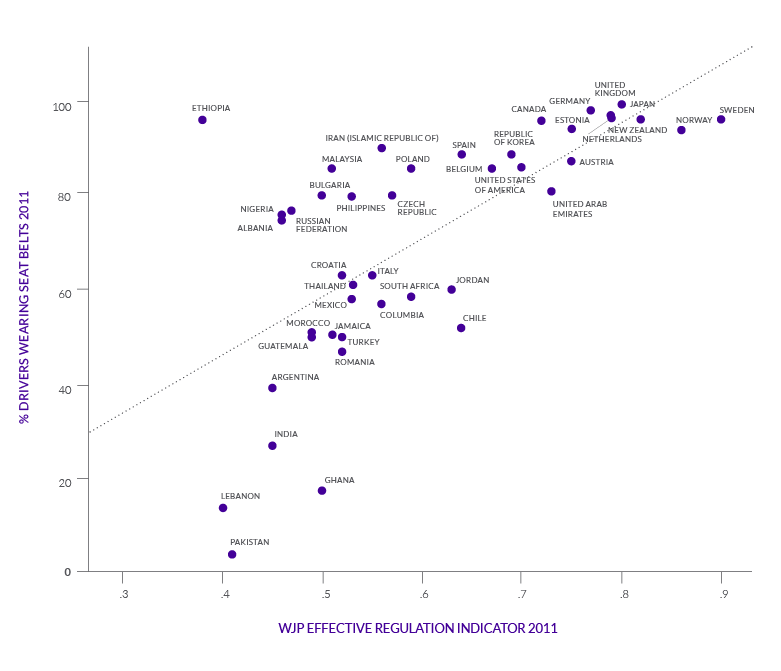
This post was co-authored by Sam Muller and Martin Gramatikov. It first appeared on Innovating Justice on August 28, 2014.
Taxis don't speak but they can tell us a lot about a country and its spirit. In Bamako, the capital of Mali, your usual taxi is a 1980s Mercedes. Their shabby looks, grungy radios, funny engine sounds and uncanny odours are revealing about the creativity of Malian taxi drivers and mechanics. One particular feature of driving in Mali is that very few drivers, if any, wear seat belts. Although it is compulsory by law, traffic police officers do not seem to be particularly bothered.
As experts in the business of the measurement of justice we immediately thought: is this an indication of poor capacity to enforce the law? Put differently: is the mere fact of not wearing seat belts a proxy of the rule of law in a particular country? Or even some of its facets?
To test the hypothesised link between wearing seat belts and the rule of law we searched for a simple correlation between the two. Relevant data was found in two respected datasets.1 Our rudimentary theory is that the ability of public authorities to enforce traffic regulations regarding something as voluminous as seat belts is indicative of the general capacity to implement legal rules. Hence, our hypothesis is that the percentage of drivers wearing seat belts is associated with the rule of law. If the hypothesised link exists, and is not caused by something else (we will test this in a future blog), we can claim that observing seat belts tells us something about the rule of law.
As the scatter plot below demonstrates, there is a strong and significant positive correlation2 between the rate of wearing seat belts and the index of effective regulation. An increase in the percentage of compliance is associated with an increase in the rule of law indicator. Of course, there are notable exceptions. Ethiopia, for example, reports a high compliance rate of 96% but has the lowest score on effective regulation. The reasons for the existence of such outliers should be analysed carefully. Nevertheless, the association between the two is very strong. See the chart below:

Correlation does not mean causation: it is possible that there are measurement errors and confounding variables. Seat belt-wearing rates are self-reported by the countries so therefore, it is possible that the estimates differ from reality. The relationship could also be largely defined by the level of economic development so when controlling for GDP the link disappears. For instance, there are more new cars in wealthier societies and many newer models have automatic and hugely effective, if not annoying, means for urging the drivers to buckle up.
Despite the inherent measurement challenges, we are convinced that many observable phenomena are good proxies of the rule of law. Implementation of food and safety regulations, traffic laws and zoning and planning rules are just a few of the promising areas for further exploration. The benefit of such proxies is that they can improve our understanding about the rule of law at relatively low costs and effort, and probably with greater speed than conducting a survey. Such proxies can give us a sense of whether things are improving or deteriorating in different parts of the rule of law. They can also tell us something about what really happens. We challenge you: what proxies can you think of?
(1) One is the World Health Organization Seat Belt Wearing index (http://www.who.int/) which has country-level data for 2011. To improve the comparability across countries we use the percentage of drivers wearing seat belts. As a measure of the rule of law we use the Effective regulation dimension of the World Justice Project Rule of Law index for 2011 (http://worldjusticeproject.org/rule-of-law-index).
(2) Correlation coefficient=.67, p<.00, n=43






